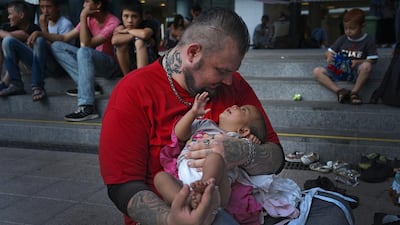BUDAPEST // He’s 6-foot-6, built like a heavyweight boxer and has tattoos all over his body. Baba Mujhse may sound like the type of guy most people would run away from – but hundreds of desperate migrants are instead running to him for help.
This gentle giant, with a Hungarian-Jewish mother and Egyptian-Muslim father, is a living embodiment of reconciliation as he helps the mostly Islamic asylum seekers who turn up exhausted every day at Budapest’s main train station.
Mujhse, a fluent Arabic speaker, and his posse of volunteers help out at Keleti station, Hungary’s most popular train terminal for migrants because it’s the departure point for trains to Austria, Germany and other wealthy European Union nations.
“The first time I came here, one of my friends said we should come because there are a lot of Arabs coming and we should try to help,” Mujhse, a 31-year-old textile designer, said on a recent scorching afternoon. “So we came out and I got stuck here. It was supposed to be a one-off occasion and it’s now been two or three months.”
Mujhse’s parents met at a Budapest university and decided to celebrate their respective religions – together observing the holidays of both faiths. The parents moved to Cairo years ago, but Mujhse stayed in the Hungarian capital. His multicultural background is now serving him well as he serves others.
The good Samaritan’s huge size has mostly been an advantage in his volunteer work, dissuading far-right groups intent on intimidating migrants at the station.
“It creates a feeling of security in the migrants,” Mujhse said, after distributing boxes of muesli bars to children and helping fill a plastic tub for a baby’s bath. But sometimes his daunting appearance scares the migrants as well.
Mujhse and the volunteers quickly learned which religions or ethnicities needed to be given space of their own.
“The Syrians and the Afghans, for example, sit fully separated,” said Mujhse. “The Syrians don’t consider the faith of the Afghans to be as strong as their own. They stick to these unwritten rules of not mixing.”
Every couple of hours, Mujhse and fellow volunteers meet the trains coming in from southern Hungary and Serbia. Hungary expects to finish building a 4-meter (13-foot) high fence on its 175-kilometer (109-mile) border with Serbia this month, which Prime Minister Viktor Orban says is needed to defend Hungary and the rest of the EU from waves of migrants.
The government has also set up billboards around the country with messages like “If you come to Hungary, you have to obey our laws” – and will soon launch a similar anti-migrant campaign in countries like Greece and Serbia, which migrants traverse on their way to Hungary.
In contrast, volunteers like Mujhse are leading a grass-roots movement to provide migrants food, clothes, toys, medical assistance – and kindness.
“They believe they can provide a better life for their children and I believe I can help them. We complement each other,” Mujhse said. “They give me patience, faith and a lot of love, while I can give them hope.”
Volunteers check the train station’s arrivals board to see where their train will roll into. Once the information is posted, it’s a mad dash to reach the last two cars – reserved for the migrants – to ensure the volunteers arrive before the migrants scatter.
The sprint of several hundred meters (yards) leaves Mujhse out of breath. He quickly recovers and is soon helping children off the train, guiding the migrants to the transit zone, and asking about any special needs.
More than 120,000 migrants have entered Hungary this year, nearly three times as many as in all of 2014. Over the past month, about 1,500 a day have been arriving, mostly from Syria, Afghanistan and other conflict zones.
After registering with Hungarian authorities and applying for asylum, they are sent by train to one of Hungary’s reception centers, a trip that takes them through Budapest. After months of ignoring the hundreds of migrants sleeping at train terminals or in nearby parks, the city has now set up “transit zones” at its three largest train stations. The areas are cordoned off, with bathroom and shower facilities, trash bins and most importantly, drinking faucets.
The transit zone at Keleti is in the underpass of the recently renovated train terminal. About 300 migrants were there one recent day, many families with small children, sitting on blankets or sleeping bags, enduring the heat. Some children played dodge ball.
Mujhse and the volunteers say the thanks they receive make all the hard work worthwhile.
“We’ve received a lot of feedback from those who are now in the camps or have reached their objective and are already abroad, their families reunited, and their lives resolved,” Mujhse said.
“When I come down to the station or get on the train, they greet me and hug me,” Mujhse added. “It compensates for everything – the time, the energy, everything.”
Associated Press

